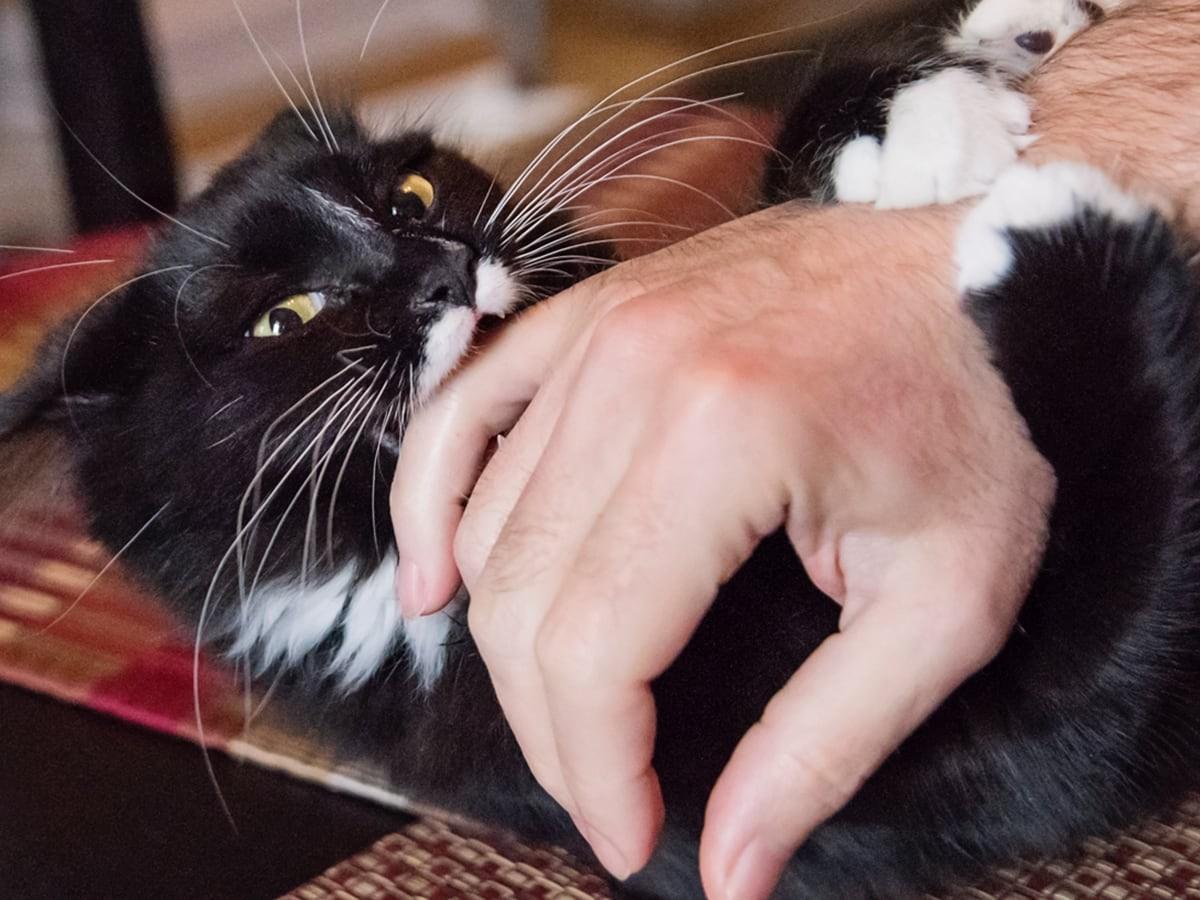Cats express themselves in various ways. As a cat owner, you might ask yourself, “Why is my cat doing this? What does it mean?”. From grazing against your legs, raising the hair on their backs, or purring – cats are constantly communicating with us in their own ways.
Let’s look at the typical reasons your feline family member might be biting.
They don’t want to be pet anymore.
Often cats will bite amidst seemingly enjoyable pets you’re giving them. It can be confusing if you are loving on your cat and their demeanor suddenly switches to aggression. Sometimes your cat will pop up and bite you to let you know they don’t like where you’re petting or are over the attention.
If you touch a specific area of your cat and they nip you, it is probably their way of telling you that it is uncomfortable for them and they don’t want to be pet there. In these scenarios, look out for body language. Your cat will typically start to show subtle signs before a bite to signal that they want the petting to end. If they tense up or their tail and ears twitch and sway – you may want to stop before they get your hand! Please don’t fret; you have not hurt your cat or made them angry with you. They are just setting a boundary of their space and time when it comes to attention.
They’re giving you a love nip.
A love bite might sound contradictory, but it is common for your cat to use a little nip to show affection. If you consider that cats use this behavior to show affection amongst each other, it is really heartwarming. This is one of the ways they are showing you that they love you.
But even a bite trying to show love can hurt and constitute unwanted behavior. If your cat is hurting you, use an adverse reaction to signal that you do not praise this. Cats will yelp or squeal to tell each other that something hurts. Mimicking this behavior can show your cat that you do not like nipping.
They’re teething.
Like babies, if your cat is in its kitten phase – it might be experiencing teething pain. As their baby teeth shift and their permanent teeth come in, it can cause discomfort. Kittens will try to relieve this pain with anything they can get their mouths on – from your hand to the leg of a chair. Teething might go on for a few months and typically starts around nine weeks. So if your cat is around this age and nipping at you – don’t worry. Your kitten probably isn’t exhibiting any behavioral issues or trying to harm you; they are just dealing with their shifting teeth. It can be good to get specific kitten teething toys so you can deter them from using you as their chew toy.
They’re not a fan of petting.
Every cat has personal preferences for showing affection and how they want to receive it. Your cat might not be a fan of lots of petting. Biting and other body language is their way of showing that they don’t want to be touched. To avoid being bitten, it is good to respect these boundaries and only pet your cat when they want. If you don’t listen to their initial signs of discomfort, their behavior might escalate, and you might get hurt.
It is not unusual for cats to be averse to petting as they like to have their own space. With that said, if your cat is usually fond of petting and starts to react with aggression, this could mean they are sick or injured. If this is the case, look out for other symptoms and consult your vet.
They are scared.
Cats can easily get startled or nervous when things are changing around them. A shift in routine, location, or people are all factors that might make your cat experience fear. A cat’s natural reaction to being scared can be aggression or biting if you anticipate something that might startle your cat, prepare for this possible reaction. You might want to comfort them to relieve their anxiety, but it is better to let them decompress independently. Giving them attention at this time might warrant further unwanted behavior as they are on edge already.
They are grooming you.
Cats will often groom themselves to remove knots or old hair from their fur. Using their rough tongues, they clean off their coat – and they might be trying to do the same thing to you. Your cat grooming you is one way they might choose to show affection; little nips or bites can sometimes accompany it. This behavior is meant to be loving, but again – it can hurt. Like any other time your cat is nipping you, and it is painful, let out a yelp to show them you don’t like it.
How do I know why my cat is biting?
Knowing some of the possible reasons your cat might be biting you is crucial to understanding what might explain a specific bite. In any of these instances, bites can be painful. It is essential to pay attention to how and when your cat is biting to decipher what might be making it do so. It is good to show your cat that you do not enjoy being nipped for any of these reasons. Establish that this behavior is not praised and deter them from putting your hands in their mouth.
If your cat is biting because they are showing you they are uncomfortable. It is probably best to leave them be. Don’t push more affection and take your cat’s bite as a sign that they need space.
In closing
Overall, biting is normal, and cats use it for various emotions. Pay attention to your feline family member and how they feel to determine what they might need – or don’t want. Like us, cats have boundaries, so respecting these will help reduce instances of them biting you.
If your cat is biting often and aggressively, you might want to work to deter this behavior and possibly discuss with your vet why your cat is lashing out.

Mostly a tech person, always a pet person. I am dedicated to improving the lives of pets and their humans with technology. Off-duty, I enjoy writing about the misbehaving of computer programs and my two Aussiedoodles, Calvin and Hobbes.
Persistent Deciduous Teeth (Baby Teeth) In Cats | (vcaanimalhospitals.com)
Why Does My Cat Bite Me? 8 Common Causes and What You Can Do About It | (petsradar.com)
Why Does My Cat Bite Me Gently? – 6 Most Common Reasons | (fveap.org)












